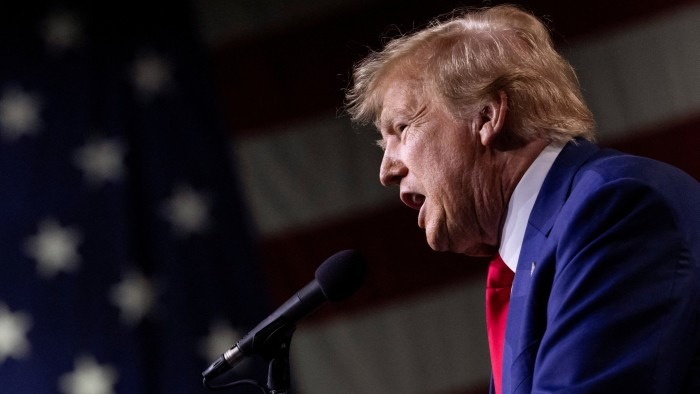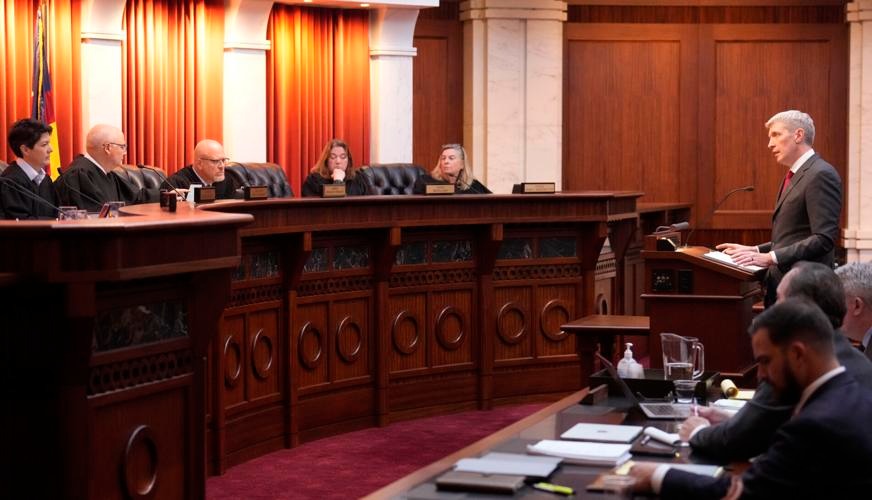
Colorado ruling cited 14th Amendment for Trump’s incitement
The US Supreme Court will review Donald Trump’s appeal against the Colorado verdict, which mandated his removal from the state ballot, citing the 14th Amendment due to incitement of insurrection.
On Friday, the court’s brief order set the stage for a historic moment in American history. The case is scheduled for argument on 8 February, coinciding with the Republican primary in full swing after Iowa, New Hampshire, and Nevada have voted. Given Trump’s disqualification from the Maine ballot, currently under appeal in state court, a swift decision is anticipated.
The Colorado primary, scheduled for 5 March, necessitates overseas ballots to be mailed by 20 January and others between 12 and 16 February. However, the suspension of Trump remains on hold during the ongoing Supreme Court appeal.
Amid a pivotal presidential election, the case is expected to progress swiftly, drawing intense attention. According to Carl Tobias, a University of Richmond law professor, the set oral argument on 8 February indicates an exceptionally expedited appeal. This may result in briefs being due promptly, possibly within a week or ten days for each side.
The 14th Amendment, ratified post-Civil War, aimed to disqualify backers of Confederate states from holding office but has seen limited use. Following Trump’s impeachment and subsequent Senate acquittal regarding the January 6, 2021, Capitol attack, cases against him surged. These cases quickly overshadowed the 2024 Republican presidential primary, despite Trump persisting in asserting electoral fraud led to his 2020 defeat by Joe Biden.
Efforts to use the Fourteenth Amendment against Trump in different states have either met with failure or await resolution.
On December 19, the Colorado Supreme Court ruled against Trump but delayed the implementation until January 4, awaiting an appeal. The recent appeal from Trump’s legal team contended that only Congress had jurisdiction over such matters and asserted that Section 3 of the 14th Amendment didn’t pertain to the presidency or vice presidency, as they weren’t explicitly mentioned.
According to ABC News, discussions during the amendment’s passage in 1866 included references indicating the inclusion of the presidency.
Respected legal figures like Laurence Tribe from Harvard and retired conservative judge J. Michael Luttig have voiced that Trump ought to be barred from pursuing the presidency in line with the 14th Amendment.
Luttig, known for his memorable testimony before the House January 6 committee, hailed the Colorado ruling as “historic” and a “monumental decision of constitutional law,” describing it as “masterful” and “unassailable.” He further emphasized that the US Supreme Court’s ruling would likely be “arguably the single most important constitutional decision in all of our history.”
Various conservative lawyers, professors, and all major Republican contenders opposing Trump’s nomination have raised doubts regarding Section 3’s application to the presidency or to someone not convicted of insurrection. Additionally, a majority, including senior Democrats, have criticized the Colorado ruling as undemocratic, asserting that voters should determine Trump’s suitability for office.
Contrary to these arguments, Luttig has countered by stating, “The 14th Amendment itself, in Section 3, addresses whether disqualification is ‘anti-democratic,’ asserting that it is not. Instead, it is the behavior leading to disqualification that goes against democratic principles, as per the constitution’s mandate.”
Trump is confronted with considerable legal exposure, grappling with 91 criminal charges across four indictments, including 17 related to election interference. Additionally, civil lawsuits loom over his business dealings, including a defamation case stemming from a rape allegation deemed “substantially true” by a judge.
Despite these legal challenges, he maintains a commanding lead in Republican polls. If the Supreme Court were to rule against him in the Colorado case, the United States would navigate unfamiliar territory.
Steven Cheung, Trump’s spokesperson, stated on Friday that the campaign embraces “an impartial opportunity at the Supreme Court to challenge the Colorado decision, characterized as bad-faith, election-meddling, voter-suppression, backed by Democrats and led by Biden, and an abuse of the 14th Amendment.”
Cheung also alleged that the Colorado case and similar ones were “components of a well-financed initiative by leftist activists determined to obstruct President Trump’s lawful re-election this November, even if it involves depriving voters of their rights.

In his blog post, Richard Hasen, a professor of election law at the University of California, Los Angeles, highlighted uncertainties regarding the unfolding of the Supreme Court case. He mentioned a rather amorphous filing from Trump’s lawyers and noted that Colorado’s legal team “presented three questions that partially intersect with Trump’s assertions.”
Hasen expressed his view that this scenario might lead to an open-ended exchange of arguments and briefings. He concluded by saying, “Get ready for a tumultuous journey ahead; it’s going to be quite an unpredictable ride from here on.”
That’s almost certain. The Supreme Court isn’t merely leaning 6-3 towards conservative justices who have issued significant rulings, such as revoking the federal abortion right; it also comprises three justices appointed during Trump’s presidency.
In a controversial statement on Thursday, a Trump lawyer named Alina Habba sparked debate by suggesting on Fox News that one of these appointees, Brett Kavanaugh, would now strongly support the individual who nominated him to the court.
There’s controversy swirling around Clarence Thomas, the most tenured justice, whose wife, the conservative activist Ginni Thomas, was connected to Trump’s efforts to undermine the election.
Christina Harvey, the executive director of Stand Up America, a progressive advocacy group, stated on Friday that Thomas should abstain from involvement in the Colorado case.
Harvey emphasized, “The American people deserve an unbiased and just evaluation, devoid of any conflicts of interest. Justice Thomas’s persistent refusal to withdraw from this case and others associated with attempts to challenge the 2020 election raises concerns about the fairness of the legal system and the impact of political predispositions.
“As faith in the Supreme Court diminishes, rulings of this nature further solidify the perception that justices are political figures behind judicial robes. To initiate the restoration of public trust in our top judicial body, Thomas must recuse himself.



